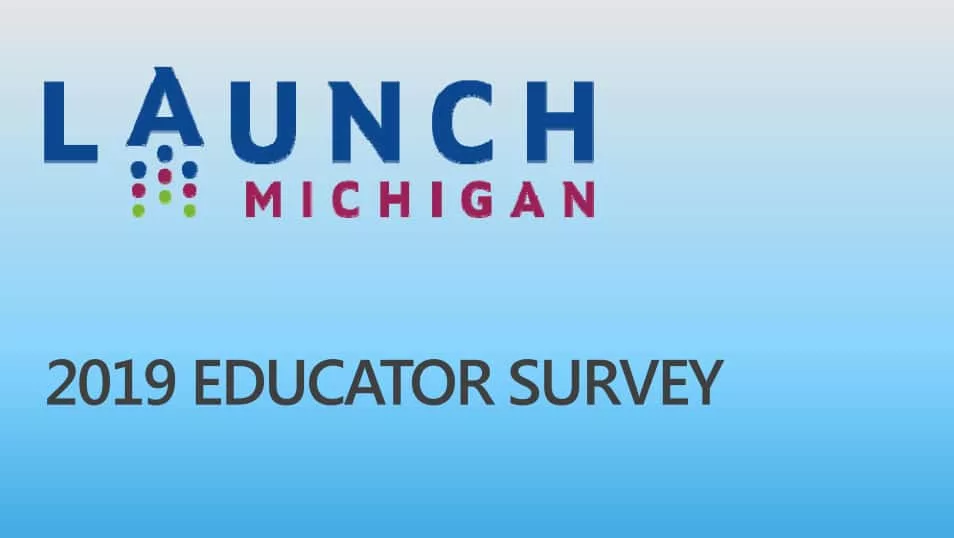A comprehensive new statewide survey might not bode well for the future of education in Michigan. The good news is teachers across the state clearly have a passion for what they do. The bad news is the vast majority of them would not recommend their job to young people in search of a career, and more than one in ten plan to leave education within the next couple of years themselves.
That is one of the major takeaways from the results posted yesterday from a statewide educator survey conducted last month, sharing extensive front-line perceptions from nearly 17,000 educators across the state.
The survey was fielded by Launch Michigan, a diverse alliance of education, labor, business and philanthropic organizations committed to establishing a shared agenda to ensure all Michigan students receive a best-in-class education.
The online survey was fielded by Emma White Research LLC from February 4th-to-the-19th and garnered 16,878 responses from a broad variety of Michigan educators, including teachers, school support staff and administrators. The project was modeled after a similar educator survey fielded in Tennessee, a state that has seen rapid improvement in public education in recent years.
White says, “This is a very rich set of data that provides Launch Michigan with a good read into the perceptions of front-line educators across the state.” She adds, “The results show the passion that educators have for their students and their careers, as well as the challenges and opportunities that lie ahead for education policy in this state.”
Key findings include:
- Educators are relatively positive about climate at their own schools, though not as universally as in Tennessee.
- 77% are “generally satisfied with being a teacher at this school” (87% in Tennessee);
- 64% feel appreciated for the job they are doing (79% in Tennessee);
- Just over half of teachers feel empowered to teach in the way that is best for their students (56%) rather than constrained (31%). In Tennessee, 73% feel empowered and only 13% constrained.
- Only 25% of educators would recommend the career to others. Educators say the things that most negatively affect their professional satisfaction include lack of support from policy-makers and politicians (72%) and lack of respect for the profession (66%).
- Excessive workload, bureaucracy and paperwork (64%) and better salaries in other fields (60%) are also considered negative drivers.
- Over one in ten (12%) say they plan to leave education for a different career over the next two to three years. Statistical analysis suggests that important drivers of this move include class sizes (having larger class sizes predicts leaving), and a number of attitudes and experiences, including feeling constrained rather than empowered in the classroom.
- Educators lean toward negative views on the quality of the professional learning they receive and the fairness and value of the teacher evaluation process. We see big gaps when compared to Tennessee on these issues.
- Just 43% report receiving professional learning suggestions tailored to them (compared to 77% in Tennessee).
- Only half of teachers (47%) say the teacher evaluation process is fair and even fewer (35%) say it has improved their teaching (compared to 77% and 72% in Tennessee).
- The data also reveal gaps in literacy supports – a critically important area, especially as Michigan moves toward implementation of the law requiring retention of 3rd graders who do not meet literacy benchmarks.
- Nearly a quarter of educators (24%) say their school is not ready to provide any additional support for students who are held back – this rises to over four in ten in certain types of urban districts, especially those with high poverty and low per pupil spending.
- While majorities say their school libraries and classrooms have enough reading material for students, over three in ten do not — particularly in the same high poverty and lower-spending urban districts
- Large majorities of educators say each of the policy solutions presented in the survey would improve schools.
- Reducing class sizes (80% say it would make a “large impact”) and expanding access to high quality pre-school (65%) are the proposals most broadly identified as leading to big improvement in the schools.
- Majorities also say allocating funding based on student need, effective mentoring for early-career teachers and principals, and expanding programs to connect families with social services will have a large impact.
- Although fewer say additional literacy coaches would make a large impact (38%), this may be partly a function of awareness. Where literacy coaches and literacy interventionists are available (43% and 56% respectively say they have access to these supports), over two thirds of educators describe them as helpful.
The survey findings will be used by Launch Michigan to guide a set of policy recommendations it intends to propose to the Governor and state Legislature later this spring.
You can view the full survey report by clicking this link: LaunchMichigan2019EducatorSurvey
View the webinar recording conducted by Emma White by clicking this link and then using the Password: Launch2019
https://mea.webex.com/recordingservice/sites/mea/recording/playback/57e6a29ac49b4446b295099dbae71240
Launch Michigan is an alliance of leaders from Michigan’s education, business, labor, civic, and philanthropic sectors, focused on improving K-12 education outcomes. Its members are committed to working across political and ideological lines to uphold a common agenda aimed at building a strong, thriving public education system for all Michigan students. More information and a complete list of partners is available online at www.LaunchMichigan.org.






